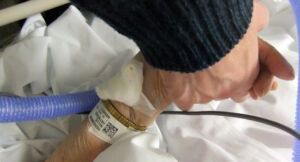Opinion
Guest opinion: The decision to legalise euthanasia doesn’t start or end with feelings
Captain Stephen Dean Paul
This article is more than 2 years old.
OPINION: Following the PM’s re-opening of the ‘aktiv dødshjælp’ discussion, a Danish-based Canadian reflects on the difficulties of caring for his terminally-ill mother who chose to end her life recently with the aid of the Medical Assistance in Dying program in her homeland

More control of letting go (photo: Lee J Haywood/ Creative Commons License)
I’ve read several articles recently about Mette Frederiksen’s re-opening of the ‘aktiv dødshjælp’ (euthanasia) discussion. They are full of stories and ‘examples’ of the terrible things that are happening in other countries where doctor-assisted suicide has been legalised. Some of them may be true; most of them are anecdotal.
Your life, so your opinion is paramount
My mother died in November 2022. She used the MAiD (Medical Assistance in Dying) program when she decided she couldn’t go on anymore. I left my home in Denmark and went to be with her in Canada, moving through the diagnosis phase to the care-giving phase, finally ending with her medically-assisted death.
I could write pages and pages packed full of stories and feelings, having gone through it with my mother, but one thing sticks out in my mind when it comes to the debate over medically-assisted death. Not all, but most of the people showering us with their opinions haven’t been care-givers to a terminally-ill patient. They haven’t had the challenge of changing their 73-year-old mother’s bra or having to get up four times a night to listen to her cry while waiting for the hydromorphone to kick in and help ease the pain.
We could fill a million pages with stories, feelings and opinions about assisted dying, but it misses the point entirely. The decision to legalise assisted dying doesn’t start or end with feelings, stories or opinions. It is only about your right to choose what’s best for you. Your personal autonomy and freedom to make choices about your life or death.
What does history tell us?
The opinion pieces out there now against assisted dying are exactly what they sound like. Opinions … Your right to make choices about your life or death shouldn’t be and can’t be derailed by someone else’s opinions or belief system. Imagine that for one moment.
Instead of opinions let’s talk about history. Denmark decriminalised suicide in 1933, meaning that if you tried suicide and failed you would not be charged criminally … now for some maths. That was almost 100 years ago! The decision was rooted in personal autonomy (the belief that individuals have the right to make decisions about their own lives).
Fast-forward 50 years to 1973 and now we will start discussing ‘Pulling the Plug’ – your right to refuse treatment even if that refusal ends your life. So the refusal of a respirator, refusal of a ventilator, or refusal of dialysis or antibiotics.
Arguments for ‘Pulling the plug’
During those debates these were the most common arguments:
Slippery Slope – What does slippery slope actually mean? It suggests that legalising these practices may lead to unintended consequences and a gradual expansion of their scope beyond the initially intended boundaries. Once assisted dying is legalised, will people feel an obligation to do it, so they are not a burden to family or society? This has not been realised in the data that’s been collected. The fear especially is that the elderly, along with marginalised, poor and underrepresented citizens, will feel pressure to end their life. Overwhelmingly the data collected shows that most users of doctor-assisted deaths are generally more wealthy, educated and younger. The predictions of things getting out of control and people being taken advantage of have not happened. Anywhere …
Ethics conflict or desensitisation of doctors – ‘Do no harm’ is a phrase we are all familiar with from the Hippocratic Oath that doctors must take. This has been around in one form or another since 300 BC. It is a very traditional way of looking at things. Here’s an opinion for you: if you are suffering intolerably or are terminal and your doctor denies you your right to die, they are causing you harm. Real, tangible harm …
Sanctity of life – This is a difficult one. I appreciate people who have strong religious convictions. I am authentically impressed by their ability to embrace and live their life according to a story, whether it be a Christian story, Muslim story, Jewish story, Buddhist story etc. Clearly though, someone else’s story has no place in your decision to live or die.
A lot has changed in 50 years
Do these arguments sound familiar? They should. They are the exact same arguments being turned over and over regarding assisted dying. We debated and settled these arguments 50 years ago.
I dare you to walk outside and ask 100 people if a person should have the right to refuse lifesaving treatment? Most of them might not even know what you’re talking about. It’s become so common place and part of our societal norms that it’s not a question that gets asked anymore.
In fact, maybe someone reading this could educate me on how the refusal or withdrawal of treatment by doctors is regulated. Assisted dying in Canada is heavily regulated and comes with enough checks and paperwork to make your head spin. Why is life ending withdrawal of treatment not regulated and universally accepted?
Peace of mind
Now that we’ve done a little history and maths, let’s move onto some facts and end with an opinion.
Only 30 percent of people in Canada use the MAiD service once approved. I want you to imagine you have been diagnosed with something like ALS or perhaps terminal cancer. You know that at some point in the future your ability to make decisions for yourself will be compromised. You’re full of doubt and terrified about how you will manage the disease and all of the suffering it will bring.
Imagine you live in Denmark and have very few options. What kind of decisions will you make knowing that if you wait, you may not be capable of making the decision anymore. You’ll make a rash decision not knowing how your disease will evolve and or how you will tolerate the disease. Fear of running out of options will cause premature actions.
Imagine you live somewhere that you have options, knowing that if the time comes when you can’t tolerate life anymore you have a dignified way out. It puts you at ease and gives you time to manage your disease and diagnosis without the unbearable stress of losing control over your decisions about your life.
Data makes a strong case
Fifty years ago when we were having these debates there was no data to help us make the decisions. Assisted dying has been legal in Switzerland since 1942, legal in Oregon, USA since 1997, legal in the Netherlands and Belgium since 2002, and legal in Canada since 2016.
We now have lots of data and surveys to support the Aktiv dødshjælp debate here in Denmark. Data across all the countries shows who is using this type of service, and it does not support the fears of abuse or non-voluntary euthanasia incidences.
Surveys clearly show that the doctors and medical practitioners who were once unsure before legalisation in their countries are now overwhelmingly in favour of assisted dying.
Maybe the Aktiv dødshjælp conversation needs to move from opinion pieces in the newspaper to a section with more facts and data.
Just my opinion …

About
Captain Stephen Dean Paul
From Canada to the open seas as a superyacht captain, Stephen set anchor in Odense to open a business and be with his family. After the death of his mother last year, Stephen decided to write a book and be a positive voice for medically assistance in dying here in Denmark and abroad. For more discussion on this topic visit here.










































